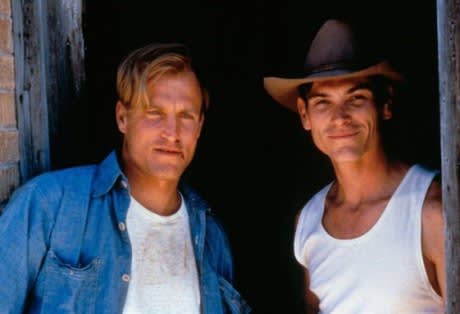Throughout his career, Stephen Frears has routinely reiterated his preoccupation with duality and change, often depicting passive ideological clashes, whether geographic, cultural, class-based or a matter of political change. It's a difficult thing to capture without caricature, since the divides often depicted, regardless of race, class or creed, are defined by archetypal elements that, conflict-wise, are easily categorized by specific signifiers. With Dangerous Liaisons, he managed to temper the end of an era, self-imposed destruction with a playful, even seductive tone of pointed cruelty that made the overly clichéd simplicity of the key players more accessible and contextually plausible. In The Hi-Lo Country, where the ending era is that of the cowboy, post-WWII, rather than the death of the French aristocracy, his tone, while deliberate and meticulous, is quite solemn and straightforward, capturing the aspect of death far more literally. Within this contemplative framework, the depiction of stereotypical cowboy Big Boy Matson (Woody Harrelson) plays as rather large and conventional, in a pseudo-cartoonish manner. Living off the land and taking what he wants without fear of consequence or external reaction — an inherently American, male construct — his existence in an increasingly regimented and corporate arena, where industrialization has all but made independent sustainability impossible, reads intentionally as fleeting and unsustainable. Through his role as defender of small town sensibilities against the imposing capitalist monopoly that Jim Ed Love (Sam Elliott) brings in, buying up all the land and putting everyone to work for a limited wage, Big Boy's confidence and brazen disposition come off as stupid rather than heroic within a climate where violence has become something increasingly passive and cognitive. His impulsiveness is exaggerated by his casual courting of the married Mona (Patricia Arquette) without fear of consequence from her husband or anyone else. And since we're intended to watch this cowboy spectacle fizzle out with time, the perspective and framing comes from his best friend, Pete (Billy Crudup), whose meek disposition leaves him envious of Big Boy's cocky temperament, dating the accessible Josepha (Penelope Cruz) despite being obsessed with Mona. This love triangle structure sustains most of the emotional conflict of the film, reiterating themes of male violence as a result of envy and greed, but also detracts, in part, from the overall ambition of creating a parable about a dying way of life. Though the intention seems to be that of exaggerated juxtaposition, framing the conventional cowboy hero as an antiquated absurdity in the face of modern life, there are too many secondary assertions and concepts to sustain a cohesive message. And since each player in the tragedy of it all is written as a cipher, whether a temptress, cowboy or an empty vessel for the audience to identify with, it's difficult to care when the inevitable comes to fruition. Still, there is something commendable and even compelling about a film that deconstructs a mythology and features two mindsets of American ethos clashing so aggressively. No supplements are included with this DVD reissue.
(Shout! Factory)The Hi-Lo Country
Stephen Frears

BY Robert BellPublished Dec 13, 2012



